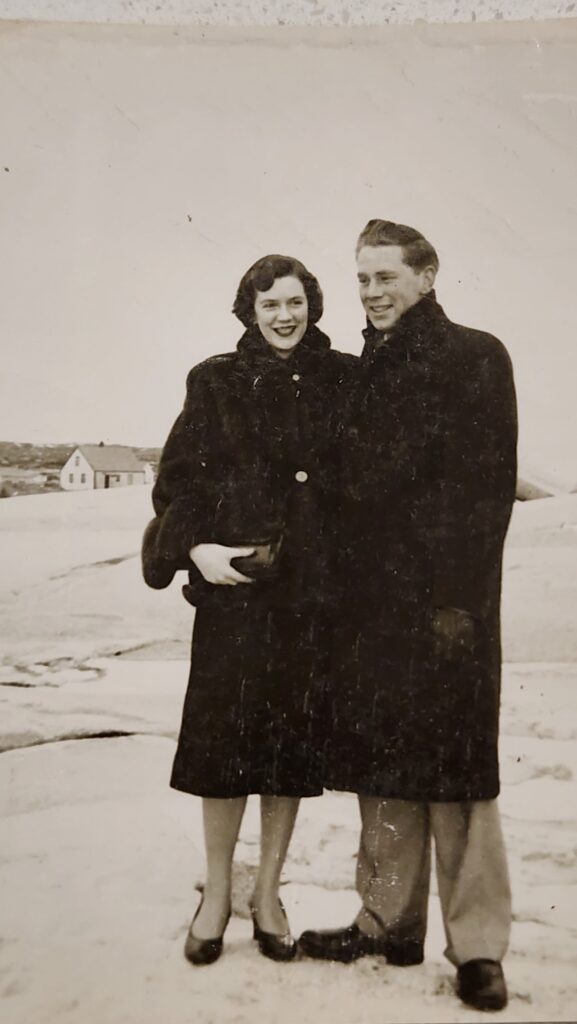

I walk on a witheringly cold winter’s afternoon to Ross and Margaretta Brown’s apartment on Lower Water Street, but I am greeted at the door with warmth by their daughter, Eilfan. She shows me inside to a comfortable apartment decorated with family heirlooms and cozy seating.
Ross and his wife, Margaretta, are very welcoming and Ross makes me a cup of hot, strong coffee. Eilfan smiles from the dining table as we settle down to chat and I ask Ross how he first became involved with the Conservatory? He looks me in the eye and says, “I met a girl on a street corner one night going to a school dance at Queen Elizabeth High School. That’s how it all came about. That was in January of nineteen fifty-two. And she happened to be the daughter of the Director.” The Director was Ifan Williams Sr. and his daughter was of course, Margaretta.
Many years later Ross joined the Board of Governors in 1973. “I’d been on the board for two years and the Chair was taken sick so they put me in on a temporary basis. Fifteen years later I was still there!” Ross smiles, “I enjoyed it. I moved the Conservatory to several locations. For example at this point in time, we’re at the old St Mary’s College on the corner of Quinpool Road and Windsor Street. They were tearing it down so I put the Conservatory in Philae. We took the Conservatory from the College to Philae (Temple on College Street) to St Mary’s University and it was there for seven or eight years. Then the President gave us notice that they required the building so we had to move out of there. I think the nun’s felt sorry for us and we were able to move into the Convent of the Sacred Heart. Around this time I was going to resign. I thought! But it didn’t quite work that way and I finally stepped down in 1990. And the Conservatory moved for the final time from the Convent to the School on Chebucto road.”
He recalls the ups and downs—the strain of having to constantly move must have been exhausting but Ross’s resilience and his modesty are typical of him. “I had a good run at it, but I guess what was good about it was Margaretta’s father.” Ross’s great respect for Ifan Williams is clear and he relates how Ifan became the director of the Conservatory. He recalls darker times too when Williams was diagnosed with Leukemia while on a visit to see his mother in the UK. Ross and Margaretta travelled there to stay close by to comfort him until his death just weeks after the diagnosis.
Ross’s memory darts backwards and forwards and he recalls a brighter time: a highlight of his at the Conservatory was the Convocation in June of 1957. “Mr. Williams came over to me and we worked Convocation between the two of us and that was quite a night. But it was the last time we saw him before his illness. Convocations at that time were at the Nova Scotia Hotel and were there ever some fine performances!” He points at a photograph “That’s Mr. Williams there,” and Margaretta identifies the people in the picture, “That’s Jean Fraser, Annie Webber and Dad”.
They talk about the heirlooms around the room. A violin of Ifan Williams rests on a table in the corner. “And that’s Mr. Williams’ personal belongings behind you”, says Ross “the music stand and the baton….and there’s a coincidence that the silver tray for Mr. Williams was engraved by my father at Birks,” and Margaretta laughs saying “they didn’t know one another, and to think that I ended up marrying Ross.” I ask Ross why he believes the Conservatory is important and he says, “We have music teaching at different Universities and my goal was to bring it up to that level to have people going into the Universities, but to have people at that level before they go into Universities…and it worked. I think when I left we had eleven hundred students and when I started it was four hundred and seventy five. It wasn’t easy at times but we got through it.” I ask Ross what he would say to those at the Conservatory today. “It’s a great organization and it’s come a long way in the last twenty years. Be proud, it’s your school and you can either make it or break it and we made it.”
When I return to the Conservatory later that day I walk through the front door and as ever I am struck by the feeling of coming home, and I am suddenly aware that without Ross there may well be no home, no Conservatory. And that is the Conservatory—without people like Ross—those who saw us through thick and thin—without them this would not be the wonderful place that it is today.
Thank you, Ross, for all you have done.